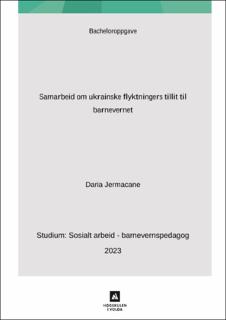| dc.contributor.author | Jermacane, Daria | |
| dc.date.accessioned | 2023-07-13T13:50:43Z | |
| dc.date.available | 2023-07-13T13:50:43Z | |
| dc.date.issued | 2023 | |
| dc.identifier.uri | https://hdl.handle.net/11250/3078603 | |
| dc.description.abstract | Ukrainske flyktninger som har kommet til Norge i løpet av 2022 blir bosatt over hele landet og blir en del av samfunnet, derfor er det viktig at de har godt forhold til tjenestene de skal møte i løpet av oppholdet sitt. Det er fortsatt lite forskning i forbindelse med ukrainerne siden de har nylig kommet til landet, men minoritetsfamilier har en tendens til å ha mistillit til det norske barnevernet. Det er derfor viktig å forebygge det samme med ukrainerne. Denne oppgaven undersøker dermed hvordan samarbeidet mellom barneverntjenesten og flyktningtjenesten kan bidra til økt tillit til barnevernet blant ukrainske flyktninger.
Dette er en litteraturstudie med to teoretiske tilnærminger som kan bli brukt i arbeidet: empowerment og kulturforståelse. Studien fokuserer seg på det forebyggende arbeidet som foregår i samarbeidet mellom de to instansene: ICDP kurs for flyktninger og dialogmøter med barnevernet. Begge foregår som en del av introduksjonsprogrammet og integreringsprosess for flyktningene. Diskusjonen viser at begge tilnærmingene kan bidra til tillit hvis de blir brukt på riktig måte i forbindelse med samarbeidet.
Empowerment kan bidra til at flyktningene får maktfølelse i møtet, føler seg hørt og respektert av profesjonsutøvere, og kulturforståelse kan bidra til god kommunikasjon på tvers av kulturelle forskjeller og føre til at kulturen blir brukt som en ressurs. Gjennom empowerment og kulturforståelse kan vi dermed konkludere at samarbeidet kan bidra til økt tillit blant ukrainske flyktninger i forhold til barnevernet, dersom profesjonsutøvere skaper trygge rammer rundt møtet og viser respekt til flyktninger som brukere og som minoritetspersoner med egen kultur. | en_US |
| dc.description.abstract | Abstract
Ukrainian refugees that have come to Norway in 2022 have been placed over the whole country and have become a part of the society, so it is crucial that they have good relationship to the services that they might meet during their stay. It is still quite little research that exists about Ukrainians since they have newly come to the country, but there is a tendency that families with ethnic minority background have lack of trust in the Norwegian child protection services and that is why it is vital to prevent the same happening with Ukrainians. This paper researches therefore how cooperation between the child protection service and refugee service can contribute to increased trust among Ukrainian refugees.
This is a literature study with two theoretical approaches that can be used during the cooperation: empowerment and cultural understanding. The study focuses on the preventive work that occurs in the cooperation: ICDP course for refugees and “dialog meetings” with the child protection services. Both are part of the introduction program for refugees and play an imperative part in their integration prosess. Discussion shows that both of the approaches can contribute to the increased trust if they are used in the right way during the collaboration.
Empowerment can contribute to the refugees feeling heard and respected by professionals and cultural understanding can contribute to good communication across cultural differences and lead to culture being used as a resource. Through empowerment and cultural understanding can we thus conclude that the cooperation between child protection services and refugee service can contribute to increased trust among Ukrainian refugees in child protection services if professionals create a safe space around interaction and show respect to refugees as individuals and people with ethnic minority background who represent their own culture. | en_US |
| dc.language.iso | nob | en_US |
| dc.publisher | Høgskulen i Volda | en_US |
| dc.title | Samarbeid om ukrainske flyktningers tillit til barnevernet | en_US |
| dc.type | Bachelor thesis | en_US |
| dc.source.pagenumber | 36 | en_US |
